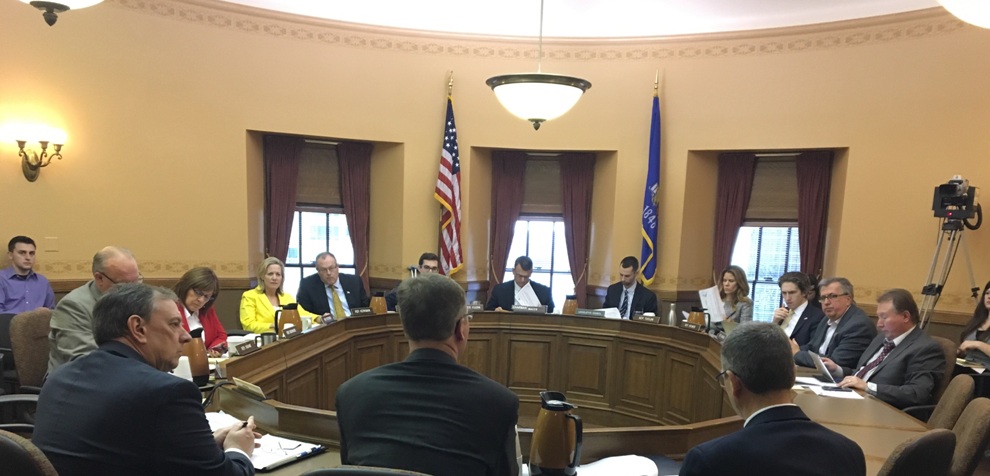|

Did you know that, at Wisconsin grocery stores, you pay sales tax on Almond Joy candy bars but not on Twix candy bars? That's because Twix bars contain flour and are therefore classified as "food," not "candy," for sales tax purposes. You pay sales tax on marshmallows, which count as "candy," but marshmallow fluff is nontaxable because it's not packaged in the form of bars, drops or pieces. These are just four examples of the 40,000 to 80,000 different products that a typical grocery store keeps in stock. Under our current system, it's the job of the store manager to interpret our complicated tax code, accurately classify each product as taxable or exempt, accurately collect tax from customers on each product category, accurately transfer the tax revenue to the Department of Revenue, and finally keep accurate records of every transaction for several years in case of a government audit. It's an enormous burden on business owners, and mistakes happen all the time. And that's just one industry; business owners and employees in all sorts of jobs endure variations on this story as a fact of life.
The photo above is from the most recent informational hearing of the Assembly Ways and Means Committee. Over the past several weeks, we have heard from retail associations, local government leaders, fiscal analysts and many other folks about how our state's tax structure can be improved. I think some big ideas are coming soon that aim to make life easier for everyone. (It's worth a few minutes of your time to watch the video of the presentation delivered to our committee by the Wisconsin Grocers Association.)
As always, I encourage you to follow my updates on social media or contact my office directly with your questions. Best wishes on your weekend!

How to Keep College Affordable?
One of the more noteworthy proposals offered by Governor Scott Walker in his 2017-19 budget request is reducing the cost of University of Wisconsin tuition by 5 percent for resident undergraduates. Under the Governor's idea, about $35 million in new taxpayer money would be paid to UW schools to "buy down" the cost of tuition, saving an average student about $360 per year.
Assembly Republicans have already led the way over the past few years on efforts to keep higher education affordable and invest in worker training. We will consider any idea to increase affordability, but as my colleague Rep. Dale Kooyenga (R-Brookfield) recently wrote, nothing is free; someone always pays. I'm interested to learn more about the Governor's proposal as the legislature evaluates his idea in the weeks ahead, but I think it's important that we maintain a healthy level of cost-sharing so that both students and taxpayers are appropriately invested in our state's future.
Take a few minutes to read Rep. Kooyenga's recent column (click here). Let me know what you think: should University of Wisconsin tuition fees be lower, higher or equal to the rates students pay today?
Spreading HOPE
This week, Attorney General Brad Schimel announced a new partnership between the state of Wisconsin and Adapt Pharma, Inc., the manufacturer of Narcan nasal spray. Narcan is an antidote to opiate drugs: it works almost instantly to save lives by reversing the effects of an overdose of heroin or other opiates. State government action in 2016 made Narcan available in Wisconsin pharmacies without a prescription. The nasal spray version comes in a ready-to-use, needle-free dose that is designed even for untrained personnel to be able to restore someone's breathing in an overdose emergency.
Over the past several months, pharmacies across Wisconsin have begun stocking the nasal spray product, but it is expensive. The new partnership announced this week allows qualified Wisconsin purchasers (police, emergency responders, governments and community organizations) to acquire the drug directly from the manufacturer at a 40 percent discount through February 2018 when purchased in bulk. Two doses of Narcan will be available to these agencies for just $75, reduced from the regular wholesale acquisition price of $125.
Since 2009, more people in Wisconsin have died from overdosing on opiate drugs than have died from car crashes. In fact, overdosing is now the leading cause of injury deaths in our state. The Wisconsin legislature has passed 17 new laws over the past few years as part of the HOPE (Heroin, Opioid Prevention and Education) Agenda in an effort to combat the epidemic. These measures are bearing fruit, but our society still needs to take more steps to defeat the challenges posed by substance abuse. I applaud the work of my colleagues and Attorney General Schimel to help make Narcan more readily available in our communities and save lives.
|

